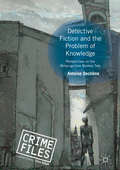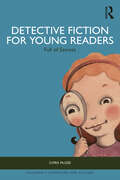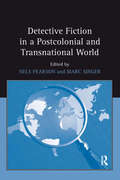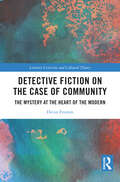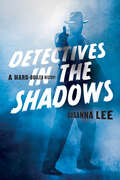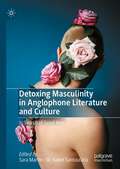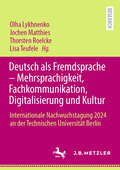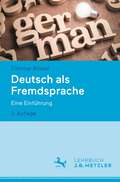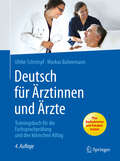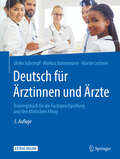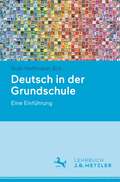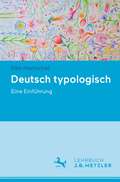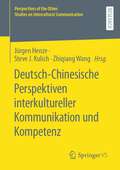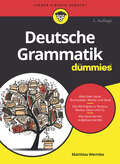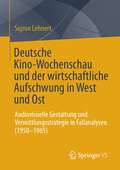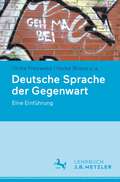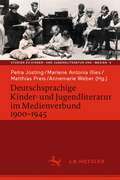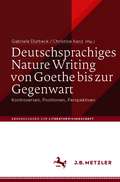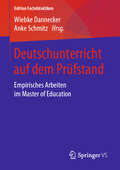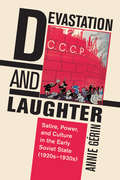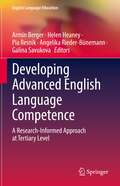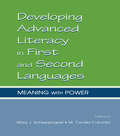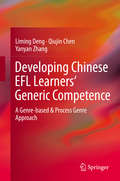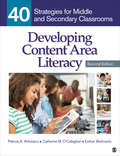- Table View
- List View
Detective Fiction and the Problem of Knowledge: Perspectives on the Metacognitive Mystery Tale (Crime Files)
by Antoine DechêneThis book establishes the genealogy of a subgenre of crime fiction that Antoine Dechêne calls the metacognitive mystery tale. It delineates a corpus of texts presenting 'unreadable' mysteries which, under the deceptively monolithic appearance of subverting traditional detective story conventions, offer a multiplicity of motifs – the overwhelming presence of chance, the unfulfilled quest for knowledge, the urban stroller lost in a labyrinthine text – that generate a vast array of epistemological and ontological uncertainties. Analysing the works of a wide variety of authors, including Edgar Allan Poe, Jorge Luis Borges, and Henry James, this book is vital reading for scholars of detective fiction.
Detective Fiction for Young Readers: Full of Secrets (Children's Literature and Culture)
by Chris McGeeDetective Fiction for Young Readers is an examination of contemporary mystery stories for children and young adults. This volume explores how the conventions, rules, and expectations of adult mystery fiction have filtered down, so to speak, especially in the past several decades, to writing for younger readers. The book is organized into three sections that explore the whodunit, the hardboiled, and the metaphysical styles of mystery fiction. Furthermore, this text analyzes how each style has been adapted for a younger audience, acknowledging and exploring representative novels most in keeping with that style. This volume is ideal for students, academics, and readers interested in children’s mystery fiction that adheres to formulas made popular after the golden age of classic detective fiction.
Detective Fiction in a Postcolonial and Transnational World
by Nels PearsonTaking up a neglected area in the study of the crime novel, this collection investigates the growing number of writers who adapt conventions of detective fiction to expose problems of law, ethics, and truth that arise in postcolonial and transnational communities. While detective fiction has been linked to imperialism and constructions of race from its earliest origins, recent developments signal the evolution of the genre into a potent framework for narrating the complexities of identity, citizenship, and justice in a postcolonial world. Among the authors considered are Vikram Chandra, Gabriel GarcÃa Márquez, Michael Ondaatje, Patrick Chamoiseau, Mario Vargas Llosa, Suki Kim, and Walter Mosley. The essays explore detective stories set in Latin America, the Caribbean, India, and North America, including novels that view the American metropolis from the point of view of Asian American, African American, or Latino characters. Offering ten new and original essays by scholars in the field, this volume highlights the diverse employment of detective fictions internationally, and uncovers important political and historical subtexts of popular crime novels.
Detective Fiction on the Case of Community: The Mystery at the Heart of the Modern (Literary Criticism and Cultural Theory)
by Devin FrommDetective Fiction on the Case of Community uses one of the most popular forms of modern literature to examine one of modernity’s most trenchant problems. The project rests on the argument that detective fiction emerges specifically from an awareness of the stress that modernization puts on the possibilities of communal life, as industrialization and urbanism accelerate the alienation and atomization we recognize as modern conditions. Here the detective appears as an image of thinking still able to perceive the threads that link such alienated people together, and therefore able to imagine solutions along the lines of these obscured connections. Reading the genre’s journey, from its origins in Poe to its most unorthodox form in Pynchon, allows fresh perspectives on the possibilities and limits of modern community, from its endurance as part of modernization to its meaning today as a sticking point in theoretical debate and political activism.
Detectives in the Shadows: A Hard-Boiled History
by Susanna LeeA century of American history reflected in the iconic private eye.Steadfast in fighting crime, but operating outside the police force—and sometimes even the law—is the private detective. Driven by his own moral code, he is a shadowy figure in a trench coat standing on a street corner, his face most likely obscured by a tilted fedora, a lit cigarette dangling from his hand. The hard-boiled detective is known by his dark past, private pain, and powers of deduction. He only asks questions—never answers them. In his stories he is both the main character and the narrator.America has had a love affair with the hard-boiled detective since the 1920s, when Prohibition called into question who really stood on the right and wrong side of the law. And nowhere did this hero shine more than in crime fiction. In Detectives in the Shadows, literary and cultural critic Susanna Lee tracks the evolution of this truly American character type—from Race Williams to Philip Marlowe and from Mike Hammer to Jessica Jones. Lee explores how this character type morphs to fit an increasingly troubled world, offering compelling interpretations of The Wire, True Detective, and Jessica Jones. Suddenly, in the present day, the hard-boiled detective wears his—or her—fatigue outwardly, revealing more vulnerability than ever before. But the detective remains resolute in the face of sinister forces, ever the person of honor. For anyone interested in crime fiction and television, or for those wanting to understand America's idolization of the good guy with a gun, Detectives in the Shadows is essential reading.
Detoxing Masculinity in Anglophone Literature and Culture: In Search of Good Men
by Sara Martín M. Isabel SantaulàriaThis edited volume rethinks Masculinity Studies by breaking away from the notion of the perpetual crisis of masculinity. It argues that not enough has been done to distinguish patriarchy from masculinity and proposes to detox masculinity by offering a collection of positive representations of men in fictional and non-fictional texts. The editors show how ideas of hegemonic and toxic masculinity have been too fixed on the exploration of dominance and subservience, and too little on the men (and the male characters in fiction) who behave following other ethical, personal and socially accepted patterns. Bringing together research from different periods and genres, this collection provides broad, multidisciplinary insights into alternative representations of masculinity.
Deutsch als Fremdsprache – Mehrsprachigkeit, Fachkommunikation, Digitalisierung und Kultur: Internationale Nachwuchstagung 2024 an der Technischen Universität Berlin
by Olha Lykhnenko Jochen Matthies Thorsten Roelcke Lisa TeufeleDie internationale Nachwuchstagung Deutsch als Fremdsprache, die im Januar 2024 an der Technischen Universität Berlin stattfand, bot jungen Forschenden eine Plattform zur Präsentation ihrer Arbeiten sowie zur Vernetzung. In dem vorliegenden Band werden Beiträge aus den Themenbereichen Mehrsprachigkeit, Fachkommunikation und Wissenschaftliches Schreiben, Professionalisierung und Digitale Medien sowie Kultur und Literatur veröffentlicht. Sie spiegeln das vielfältige Interesse der Teilnehmenden und die große Bandbreite ihrer Forschung im Bereich Deutsch als Fremdsprache wider.
Deutsch als Fremdsprache: Eine Einführung
by Dietmar RöslerDieser Band informiert über alle relevanten Bereiche des Fachs Deutsch als Fremdsprache – von den Lernenden über die Lehr- und Lernformen bis hin zu den produktiven und rezeptiven Fertigkeiten. Im Zentrum der Einführung stehen die Lerngegenstände Sprache, Literatur und Landeskunde. Weitere Kapitel widmen sich den Lehrmaterialien und Medien, vom gedruckten Lehrwerk bis zum Internet, sowie den verschiedenen Konzepten der Fremdsprachenvermittlung. Im zweifarbigen Layout: Mit Definitionen, Beispielen und vielen Abbildungen. Für die 2. Auflage wurde der Band komplett durchgesehen, aktualisiert und u.a. um Abschnitte zum Einsatz digitaler Medien, zum neuen europäischen Referenzrahmen und zum zweisprachigen Sachfachunterricht ergänzt.
Deutsch für Ärztinnen und Ärzte
by Ulrike Schrimpf Markus BahnemannDieses Buch ist ein Kommunikationstrainer, mit dem Sie sich als ausländische Ärztin bzw. Arzt optimal auf Ihre praktische Tätigkeit in Deutschland und auf die geforderte Fachsprachprüfung vorbereiten können:Übungsaufgaben und Fallbeispiele bereiten auf Situationen im Klinikalltag vorAudio-Dateien zum Download mit Beispieldialogen trainieren Hörverständnis und AusspracheOnlinebasierter Vokabeltrainer hilft beim gezielten Lernen von FachbegriffenEntwickelt von der Charité International Academy Berlin, bewährt seit 3 Auflagen - einsetzbar für alle Sprachlevel ab B1.
Deutsch für Ärztinnen und Ärzte: Trainingsbuch für die Fachsprachprüfung und den klinischen Alltag
by Ulrike Schrimpf Markus Bahnemann Martin LechnerAls Arzt aus dem Ausland können Sie sich mit diesem Buch optimal auf die praktische Tätigkeit und die Fachsprachprüfung in Deutschland vorbereiten. Hintergrundwissen zum deutschen Gesundheitssystem und gezieltes Sprachtraining helfen Ihnen dabei: Aufgaben und Fallbeispiele zum Üben der Anamnese, klinischen Untersuchung, Patientenvorstellung, Aufklärung und Therapie, ärztlicher DokumentationAudio-Dateien zum Download mit Beispieldialogen trainieren Hörverständnis und AusspracheOnlinebasierter Vokabeltrainer hilft beim gezielten Lernen von FachbegriffenGrundvokabular mit englischen Übersetzungen zum Nachschlagen und erweitertes Vokabular für die wichtigsten ErkrankungenExtra: Großes Format zum effektiven Lernen und Üben.Entwickelt von der Charité International Academy Berlin, bewährt seit 4 Auflagen und einsetzbar für alle Sprachlevel ab B1. Die 5. Auflage wurde komplett gesichtet, überarbeitet und aktualisiert.
Deutsch in der Grundschule: Eine Einführung
by Ruth Hoffmann-ErzDiese Einführung verbindet Themen der Sprachwissenschaft und der Sprachdidaktik und ist speziell auf das Grundschullehramtsstudium Deutsch zugeschnitten. Fachwissenschaftliche Kapitel zu Semiotik, Phonologie, Graphematik, Textlinguistik, Grammatik sind verzahnt mit fachdidaktischen Kapiteln zu Sprechen und Zuhören, Schriftspracherwerb, Lese- und Rechtschreibdidaktik, Texte verfassen und Sprache untersuchen. So wird die Relevanz fachwissenschaftlicher Inhalte für die Lehrerprofessionalisierung ersichtlich. Der Band ist auch für die Fort- und Weiterbildung zu empfehlen. – Im zweifarbigen Layout, mit Definitionen, Beispielen und Aufgaben.
Deutsch typologisch: Eine Einführung
by Elke HentschelTypologie als die Einteilung von Untersuchungsgegenständen nach Typen basiert von Fach zu Fach auf unterschiedlichen Typen-Definitionen, die auch innerhalb eines Fachgebiets variieren können. In der Linguistik finden sich spezifische typologische Ansätze in den verschiedensten Teilgebieten, von der Lautlehre bis zur Dialektologie. Der Schwerpunkt der linguistischen Typologie und damit auch dieser Einführung liegt in den Bereichen Morphologie und Syntax. Im Mittelpunkt steht dabei das Deutsche, das anhand zahlreicher Beispiele im Kontext anderer Sprachen betrachtet wird.
Deutsch-Chinesische Perspektiven interkultureller Kommunikation und Kompetenz (Perspectives of the Other. Studies on Intercultural Communication)
by Zhiqiang Wang Jürgen Henze Steve J. KulichWie gestaltet sich Interkulturelle Kommunikation als wissenschaftliche Disziplin in China und Deutschland im Vergleich? Inwieweit gibt es Unterschiede und Ähnlichkeiten im Kulturverständnis? Inwieweit wird die Entwicklung interkultureller Kompetenz als disziplinübergreifende Herausforderung in Studium und Beruf verfolgt und wo gibt es Übereinstimmungen oder Besonderheiten im Verständnis, dem Design und den Formen der Vermittlung? Die Beitragenden zu diesem Sammelband sind seit Jahren in Lehre und Forschung mit Fragen interkultureller Kommunikation beschäftigt, als Vertreterinnen und Vertreter der Disziplin oder als perspektivisch Betroffene in anderen Wissenschaftsbereichen, in denen Interkulturalität zur zentralen Lebens- und Arbeitsperspektive/Praxis gehört.
Deutsche Grammatik für Dummies (Für Dummies)
by Matthias WermkeMögen Sie Grammatik? Nein? Keine Sorge, damit sind Sie nicht allein. Die deutsche Sprache kann ganz schön kompliziert sein. So schwierig Grammatik ist, so nützlich ist sie aber gelegentlich auch. Und damit die deutsche Grammatik Ihnen ganz bestimmt kein Kopfzerbrechen mehr bereitet, finden Sie in diesem Buch die wichtigsten Aspekte leicht verständlich erklärt. Zahlreiche Beispiele veranschaulichen die einzelnen Regeln und nebenbei lernen Sie jede Menge Wissenswertes rund um die deutsche Grammatik und ihre Bedeutung. So verlieren die vielen Regeln ihren Schrecken und werden auch Grammatikmuffeln leicht verständlich.
Deutsche Kino-Wochenschau und der wirtschaftliche Aufschwung in West und Ost: Audiovisuelle Gestaltung und Vermittlungsstrategie in Fallanalysen (1950-1965)
by Sigrun LehnertIn der Zeit des wirtschaftlichen Aufschwungs Deutschlands nach dem Zweiten Weltkrieg waren die Wochenschauen im Vorprogramm jeder Kinovorstellung eine bedeutende Informationsquelle. Mit eindrucksvollen Bildern auf einer großen Leinwand – begleitet von gesprochenem Kommentar, Musik und Geräusch – gaben sie Orientierung und prägten die Erinnerung. In zahlreichen dokumentarischen Film- und Fernsehformaten werden bis heute einzelne Bilder oder kurze Sequenzen aus der Kino-Wochenschau als historische Belege, als Illustrationen oder zur Dramatisierung verwendet. Die außergewöhnlichen Prinzipien der Informationsvermittlung kommen dabei jedoch nicht mehr zur Geltung. Um das Publikum zu erreichen, war damals eine Mischung aus informativen Berichten und unterhaltenden Beiträgen unerlässlich. Die in diesem Buch vorgenommenen Fallanalysen spiegeln elementare Themenbereiche der Zeit des wirtschaftlichen Aufschwungs beider deutscher Staaten (1950-1965) wider. Neben den Prinzipien der audiovisuellen Gestaltung wird auch die zentrale Vermittlungsstrategie herausgearbeitet. Transmediale und transnationale Aspekte, die hierbei eine Rolle spielen, weisen die Wochenschau als Teil eines (internationalen) Mediensystems aus.
Deutsche Sprache der Gegenwart: Eine Einführung
by Heike Wiese Ulrike Freywald Hans C. Boas Katharina Brizić Antje Dammel Stephan ElspaßDas Gegenwartsdeutsche ist faszinierend – vielfältig, lebendig und dynamisch. In mancher Hinsicht ist es exotisch, z.B. in der Wortstellung, in anderer eher mainstream, z.B. bei den Möglichkeiten, Wörter aus anderen Sprachen zu integrieren (z.B. ›mainstream‹). Das Buch erfasst das Deutsche in seiner ganzen Breite: Es bezieht Variation sowohl innerhalb als auch außerhalb der Standardsprache ein, beleuchtet die Rolle des Deutschen in der mehrsprachigen Gesellschaft und ordnet zentrale grammatische Merkmale in aktuelle Entwicklungstendenzen ein – stets mit Bezug auf reale sprachliche Daten und öffentlich zugängliche Textkorpora aus so unterschiedlichen Bereichen wie Kiezdeutsch, Texas German oder digitalen Chats.
Deutschsprachige Kinder- und Jugendliteratur im Medienverbund 1900-1945 (Studien zu Kinder- und Jugendliteratur und -medien #3)
by Petra Josting Marlene Antonia Illies Matthias Preis Annemarie WeberMit der Erforschung der deutschsprachigen Kinder- und Jugendliteratur und ihrer Medienverbünde im Zeitraum von 1900 bis 1945 sowie der Erfassung sämtlicher Daten in einem Onlineportal zur Recherche und visuellen Analyse liegt ein innovativer Beitrag zur Geschichtsschreibung der Kinder- und Jugendliteratur vor. Die Einleitung gibt Auskunft über Aufnahmekriterien, zentrale Quellen, theoretische Rahmungen sowie das Spektrum der eruierten Medienverbünde. Teil I versammelt drei Überblicksartikel zu den Medien Hörfunk, Film und Theater für Kinder und Jugendliche sowie einen Beitrag zur Konzeption und Entwicklung des Onlineportals. Im zweiten Teil werden 18 ausgewählte Medienverbünde vorgestellt, sortiert in die Kategorien Pioniere erobern die neuen Medien – Bühnenkinder wandern zum Rundfunk und/oder Film – Märchen im Film und Rundfunk – Klassiker in allen Medien – Schulgeschichten im Theater, Buch und auf der Leinwand – Verbrechen und Skandalöses auf der Leinwand – Politisches erobert Buch und Film.
Deutschsprachiges Nature Writing von Goethe bis zur Gegenwart: Kontroversen, Positionen, Perspektiven (Abhandlungen zur Literaturwissenschaft)
by Gabriele Dürbeck Christine KanzIn den letzten Jahren beginnt die Debatte um ein ‚New Nature Writing‘ auch im deutschsprachigen Literaturbetrieb Fuß zu fassen. Lässt sich die aus einer langen angelsächsischen Literaturtradition (White; Thoreau) stammende Kategorie ‚Nature Writing’ im deutschsprachigen Raum über die Gegenwartsliteratur hinaus auch für die Literaturgeschichte produktiv machen? Welche transnationalen Verbindungen gibt es, in welchem Verhältnis steht das Nature Writing zur Tradition der Naturlyrik und weiteren literarischen Gattungen? Warum hat sich in der Germanistik das Nature Writing als Kategorie bislang kaum etablieren können? Wäre eine neue, eigene Benennung nicht sinnvoller? Mit diesen und weiteren Fragen setzen sich international anerkannte Literaturwissenschaftler*innen in Beiträgen u.a. zu Brockes, Goethe, Novalis, Hölderlin, A. v. Humboldt, Stifter, Fontane, Lehmann, Kolmar, Kafka, Sebald, Handke und Kinsky kritisch auseinander und zeigen Kontroversen und neue Perspektiven auf.
Deutschunterricht auf dem Prüfstand: Empirisches Arbeiten im Master of Education (Edition Fachdidaktiken)
by Wiebke Dannecker Anke SchmitzDer Band skizziert Forschungsfelder im Fach Deutsch zum Kompetenzbereich Lesen und versammelt dazu quantitativ und qualitativ ausgerichtete Forschungsarbeiten von Studierenden, die im Praxissemester durchgeführt oder als Masterarbeiten realisiert wurden. Außerdem werden Projektideen zu weiteren Forschungsfeldern des Faches Deutsch aufgezeigt sowie aktuelle hochschuldidaktische Fragen bezüglich des Forschenden Lernens thematisiert. Ein besonderer Fokus liegt dabei auf der Frage der Machbarkeit studentischer Forschungsprojekte. Dazu gibt der Band, etwa hinsichtlich des Umfangs oder der Wahl der Fragestellung, exemplarisch Einblicke.Das Buch ist einerseits von Studierenden für Studierende geschrieben, um zukünftige Forschende bereits während des Studiums hinsichtlich dieses deutschdidaktischen Themenfeldes bei der Themenfindung und bei methodischen Fragen zu unterstützen. Andererseits kann es Dozierenden als Grundlage für die Beratung studentischer Projekte sowie die Gestaltung von Seminaren dienen.
Devastation and Laughter: Satire, Power, and Culture in the Early Soviet State (1920s–1930s)
by Annie GérinIn Devastation and Laughter, Annie Gérin explores the use of satire in the visual arts, the circus, theatre, and cinema under Lenin and Stalin. Gérin traces the rise and decline of the genre and argues that the use of satire in official Soviet art and propaganda was neither marginal nor un-theorized. The author sheds light on the theoretical texts written in the 1920s and 1930s by Anatoly Lunacharsky, the Soviet Commissar of Enlightenment, and the impact his writings had on satirists. While the Avant-Garde and Socialist Realism were necessarily forward-looking and utopian, satire afforded artists the means to examine critically past and present subjects, themes, and practice. Devastation and Laughter is the first work to bring Soviet theoretical writings on the use of satire to the attention of scholars outside of Russia. By introducing important bodies of work that have largely been overlooked in the fields of art history, film and theatre history, Annie Gérin provides a nuanced and alternative reading of early Soviet art.
Developing Advanced English Language Competence: A Research-Informed Approach at Tertiary Level (English Language Education #22)
by Armin Berger Helen Heaney Pia Resnik Angelika Rieder-Bünemann Galina SavukovaThis volume presents a systematic approach to developing advanced English language competence at tertiary level. It includes the reflections of experienced language teachers and teacher-researchers in the English Language Competence programme at the University of Vienna and provides examples of good practice, amalgamating teaching expertise and research with aspects of curriculum design and programme management. The book addresses a growing academic and professional interest in understanding advanced language learning and use. To date, research has tended to investigate advanced proficiency from a specific theoretical viewpoint, for example cognition, psycholinguistic processing strategies, or the assumption of a critical period or the age factor. In contrast, this work examines advanced proficiency from a curricular and instructional perspective by providing a profile of advanced-level language development in a specific institutional context. It brings together three areas of language education: curriculum design, pedagogical practice, and research. Within this triangle, advanced English language education is the focus or, conversely, advanced English language education provides the lens through which links between curriculum design, teaching, and research can be established.
Developing Advanced Literacy in First and Second Languages: Meaning With Power
by Mary J. Schleppegrell M. Cecilia ColombiThis book addresses the linguistic challenges faced by diverse populations of students at the secondary and post-secondary levels as they engage in academic tasks requiring advanced levels of reading and writing. Learning to use language in ways that meet academic expectations is a challenge for students who have had little exposure and opportunity to use such language outside of school. Although much is known about emergent literacy in the early years of schooling, much less has been written about the development of advanced literacy as students move into secondary education and beyond. Developing Advanced Literacy in First and Second Languages: Meaning With Power: *brings together work on first and second language acquisition and emphasizes the importance of developing advanced literacy in the first language, such as Spanish for bilingual students, as well as English; *spans a range of theoretical orientations and analytic approaches, drawing on work in systemic functional linguistics, genre theory, and sociocultural perspectives; *addresses the content areas of science, history, and language arts; *provides specific information about genres and grammatical features in these content areas; and *presents suggestions for teacher education. What unites the contributors to this volume is their shared commitment to a view of literacy that emphasizes both the social contexts and the linguistic challenges. The chapters collected in this volume contribute in important ways to research and pedagogy on advanced literacy development for the multilingual and multicultural students in today's classrooms. This book is particularly useful for researchers and students in language and education, applied linguistics, and others concerned with issues and challenges of advanced literacy development in first and second languages.
Developing Chinese EFL Learners' Generic Competence
by Liming Deng Qiujin Chen Yanyan ZhangThis work investigates the development of English as a Foreign Language (EFL) learners' generic competence in reading, writing and translation within the particular Chinese classroom context. It provides a new perspective for the current teaching and research in reading, writing, translation within the EFL contexts and offers an insightful framework for pedagogical applications in language learning and teaching. Its findings will be extremely valuable not only in local situations, but also more generally in a wider regional and global context as well. The book employs a series of research tools, including pre-research and post-research questionnaires, pre-test and post-test of reading/writing/translation, multi-faceted writing portfolios (including reflection reports), textual analysis and in-depth interviews. It involves 209 participants from a primary university in Wuhan, among whom 171 are undergraduates and 38 are postgraduates. And it draws on the analysis of such varied multi-sourced data both qualitatively and quantitatively. Genre-based teaching is playing a critical role in initiating EFL learners into the discourse community of the target language. Developing EFL learners' generic competence is viewed as the ultimate goal in the process of teaching and learning. This monograph effectively demonstrates that like genre-based English for Specific Purposes (ESP) pedagogies, it is also possible to take advantage of already acquired genre knowledge for use in EFL learning contexts. It offers an impressive view of the direction in which genre-based applications are likely to take in the coming years.
Developing Communicative Competence in English First and Second Semester FYBA New NEP Syllabus - SPPU
by Dr A. B. Kulkarni Dr S. K. Binnor Dr S. A. Gadekar Dr M. S Nikam"Developing Communicative Competence in English" is a textbook prescribed for the First-Year BA students under Savitribai Phule Pune University. It aligns with the National Education Policy (NEP) and is designed to enhance students' English language proficiency. The book is divided into four major sections: Building Vocabulary, Speaking for Different Purposes, Joy of Reading, and Forms of Writing. It aims to equip students with practical language skills for effective communication, critical thinking, and appreciation of literature. Through exercises, dialogues, and real-life scenarios, the book facilitates learning English for academic, professional, and interpersonal contexts, making it an essential tool for foundational competence in English.
Developing Content Area Literacy: 40 Strategies for Middle and Secondary Classrooms
by Patricia A. Antonacci Esther Berkowitz Catherine M. O′CallaghanForty evidenced-based strategies for integrating literacy instruction into the content areas Providing unique content on assessment, differentiated instruction, technology, and reflective practice, Developing Content Area Literacy, Second Edition is designed to help busy middle school and secondary teachers meet the challenge of addressing the literacy learning needs of all students, including English language learners. Each of the 40 evidence-based strategies is organized around eight essential areas of literacy instruction: academic vocabulary, reading fluency, narrative text, informational text, media and digital literacies, informational writing, critical thinking, and independent learning. Each topic has five strategies from which to choose, giving teachers ample variety to meet the diverse needs of the classroom.
